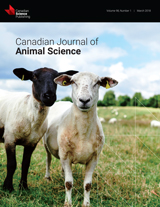The effects of natural (d-α-tocopherol) and synthetic (dl-α-tocopherol acetate) vitamin E on growth performance and antioxidant capacity of broilers in early age were investigated. A total of 144 one-day-old Arbor Acres broilers were randomly divided into three treatments (48 birds in each treatment). The birds in the control group were fed the basal diet whereas those in the treatment groups were fed basal diets supplemented with 20 IU kg-1 dl-α-tocopherol acetate or 20 IU kg-1 d-α-tocopherol for 21 d, respectively. Vitamin E supplementation, irrespective of source, significantly increased (P < 0.05) the α-tocopherol concentrations in jejunum and ileum, as well as activities of plasma total superoxide dismutase, hepatic glutathione peroxidase (GSH-PX), and ileal GSH-PX; however, the extent to increase hepatic α-tocopherol concentration was more pronounced when the source of vitamin E was natural form (P < 0.05). In addition, dietary natural vitamin E supplementation significantly increased (P < 0.05) the concentration of plasma α-tocopherol as compared with the control group, whereas the similar effect was not observed in birds given the diet supplemented with synthetic vitamin E (P > 0.05). In conclusion, dietary vitamin E supplementation, especially natural form, could enhance the antioxidant capacity and α-tocopherol accumulation of broilers in early age.
How to translate text using browser tools
22 August 2017
An evaluation of natural and synthetic vitamin E supplementation on growth performance and antioxidant capacity of broilers in early age
Kang Cheng,
Min Zhang,
Xianxiao Huang,
Xiaochuan Zheng,
Zhihua Song,
Lili Zhang,
Tian Wang
ACCESS THE FULL ARTICLE
It is not available for individual sale.
This article is only available to subscribers.
It is not available for individual sale.
It is not available for individual sale.
acétate de DL-α-tocophérol
antioxidant capacity
broilers
capacité antioxydante
dl-α-tocopherol acetate
d-α-tocopherol
D-α-tocophérol





